Experts foresee reform of hukou, capital flow
Updated: 2013-11-09 08:02
(China Daily)
|
||||||||
Editor's note: The much anticipated policy meeting of the Communist Party of China - the Third Plenary Session of the 18th CPC Central Committee - is scheduled to open on Saturday. The meeting is expected to steer the country to an historic turning point by unveiling a package of measures to deepen reforms to achieve sustainable development. China Daily invited four experts in economics as well as social and political studies to share their insights and expectations of the meeting and China's future reforms.
What would be your most expected reform in China? Why?
Opening the capital account would be one of the most expected reforms. The main benefit is that it could lead to better returns for Chinese savers, which could then lead to higher consumption of higher savings.
It would also allow the renminbi to become an international currency, providing benefits to China because foreign central banks would want to hold the renminbi, which could increase the number of buyers for China's government debt and reduce the cost of debt issuance.
The final benefit would be to assist in growing the service sector, particularly in the finance industry. Shipping and insurance are also some of the factors that could grow faster.
Reform of State-owned enterprises is also largely expected, because that would help resolve industrial overcapacity.
In which areas do you think reform would be carried out at the upcoming Third Plenary Session of the 18th CPC Central Committee? And on what scale?
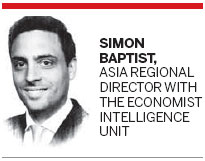
What could drive China's growth are serious policy reforms.
Interest rate and capital account reform are both happening now but slowly. There are also a series of other options such as reform of the hukou (household registration) system and reform of the services sector to allow it to grow like manufacturing has done. But the steps of reform are really small and not enough to get growth back.
The upturn in the third quarter eased worries about a crash due to bad data in previous months. Now it seems there will not be a crash but there will not be an upward cycle either. It's just temporary, partly driven by the stimulus and also recovery in Japan, the United States and Europe that drove up exports.
We see China's growth slowing over the next five years. But a lower gross domestic product doesn't necessarily mean bad news for China if it can enjoy more benefits from the growth via reform.
What would be the biggest challenges and risks in carrying out reforms?
Opening the capital account would probably cost capital flight from China and a fall in property prices.
The issue of a property price crash is definitely the biggest risk as it connects to the banks' loan sector.
Property assets are such a central part of the Chinese financial system, as well as people's savings and people's assets, so movement in the property market has a big impact on China.
Opening the capital account would also expose the currency to more volatility because, with more money coming in and out, it would be more difficult for the government to maintain a fixed exchange rate.
What sectors would experience massive reform after the meeting and why?
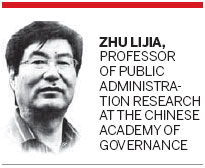
The authorities are going to put forward reform guidelines, rather than concrete measures, during the session. Just as President Xi Jinping put it many times previously, the reform guidelines would be comprehensive.
The reform will not only aim to boost economic growth, but also restructure political and social relations.
Along with economic development, lots of conflicts caused by interest distribution have appeared, which requires the ruling Party to improve the current economic, political and social relations.
Most of the current policies, especially the reform and opening-up policies made in 1978 at the Third Plenary Session of the 11th CPC Central Committee, will be kept consistent.
What kind of measures will be taken in political and administration reform?
The government will continue to transform its function to provide better services to the public and the market.
The government has to increase its capability by setting up a mechanism to appraise the work of the public sector.
Whether the fruits of economic development could benefit the people is the key question to reform.
All people, no matter whether they are from rural or urban areas, should enjoy equal rights in basic social services, including pensions, healthcare and education.
What would be the biggest challenges and risks for carrying out reforms?
The reform will definitely face challenges from interest groups who have already enjoyed much privilege under the current political system, because the reform will constrain their interests.
Social conflicts that have frequently challenged local governments are also likely to pose threats to the reform process, because the governments tend to take conservative measures to cope with emergencies.
What would be your most expected reform? Why?
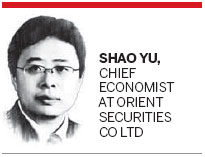
The Chinese economy should require additional impetuses to supplement the existing driving forces, such as investment, exports and consumption. The new "three horses of the troika" hauling China are in-depth urbanization, consumption upgrading and the internationalization of the renminbi.
In contrast to previous urbanization processes when migrant workers failed to accommodate themselves into the city, in-depth urbanization should aim to address key issues including the reform of the hukou system, the supply of residential apartments as well as an increase in purchasing power. The aim is to create a genuine "middle class", indicating the overriding goal of the reform is to create an urbanized population.
The upgrade of consumption ranges from the branding of traditional merchants to a wider coverage of healthcare services. It also includes technological drivers that fuel new types of purchasing, such as the burgeoning Internet finance and the fast takeoff of the 4G mobile network.
The internationalization of the renminbi indicates that China will move from lower-end exports such as shoes and socks, to exporting projects, services and even the currency. Internationalization of the renminbi will help the country achieve a comprehensive economic upgrade and provide sustained growth momentum. When the annual GDP per capita doubles to $13,000 from the current $6,500, it suggests China will have avoided the middle-income trap.
In which areas do you think reform would be carried out at the upcoming meeting? And on what scale?

It's hard to make detailed policy projections. But I believe the three new driving forces (which were mentioned before) should be achieved with corresponding reforms in the following seven areas: the financial system, the hukou system, State-owned enterprises, the land system, fiscal revenue and tax distribution system, the administrative system as well as factor price reform.
For instance, the reform of the hukou system is closely related to in-depth urbanization. More effective investments are encouraged to consolidate public transportation, infrastructure and the building of satellite cities. These will benefit both the economic output and people's welfare. Real urbanization can effectively prolong the duration of residents in the city, whose productivity will therefore be better unleashed as they get to improve their capabilities under better conditions.
What would be the biggest challenges and risks for carrying out reforms?
All I can see are two potential risks in the short run, or next year.
The first is inflation. The consumer price index is likely to rise to 3.4 to 3.5, but it will still remain at a manageable level. Besides, the producer price index has been contracting for a long time. So a price hike may be heartening news to manufacturers.
The other problem is local governments' debt problems. Recent estimates suggest that all levels of government bear a combined debt burden totaling 29.5 trillion yuan ($4.84 trillion). In the foreseeable future, the debt servicing ratio will hit 100 percent. Given that net assets of the governments amount to 33 trillion yuan, the major concern remains liquidity issues.
What would be your most expected reform? Why?
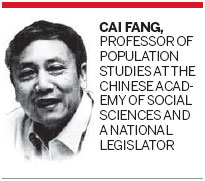
The reform should be comprehensive, covering all important sectors.
Reform of the hukou system could bring about a more sufficient labor supply and improve the labor participation rate. Meanwhile, it could stabilize the group of migrant workers in cities, especially the young generation of migrant workers. It is a move to guarantee social stability in the future.
Besides, any country that wants to realize modernization must improve the proportion of urbanization.
What measures will be taken on social reform? How should China cope with the diminishing demographic dividends?
There has been negative growth in the working population since 2011. No country can rely on a demographic dividend forever.
Our rapid economic growth would slow down eventually. The growth would instead come from technological progress and productivity improvement.
To achieve technological progress, we have independent innovation and can also introduce, absorb and digest the experience from other countries and then re-innovate.

Through reform, we should target institutional dividends. Currently there are still many institutional obstacles that are hindering efficiency.
What would be the biggest challenges and risks for carrying out reforms?
The reform could affect vested interests. We need political courage and wisdom to tackle vested interests, a subject mentioned at the 18th National Congress of the Communist Party of China.
(China Daily 11/09/2013 page3)

 Chinese Americans protest Kimmel joke in NYC
Chinese Americans protest Kimmel joke in NYC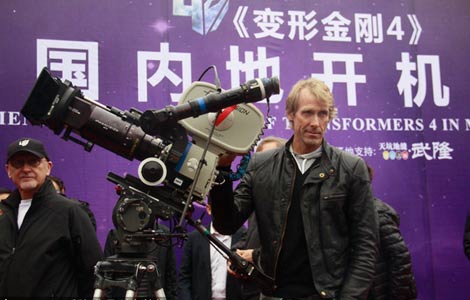
 Brand China in leading role on Transformers set
Brand China in leading role on Transformers set
 Super typhoon Haiyan slams into Philippines
Super typhoon Haiyan slams into Philippines
 Market moves to modern mall as Lhasa safeguards the past
Market moves to modern mall as Lhasa safeguards the past
 In small-town China, movies are big
In small-town China, movies are big
 A gathering of gourmets
A gathering of gourmets
 50 arrested at LA protest over Wal-Mart wages
50 arrested at LA protest over Wal-Mart wages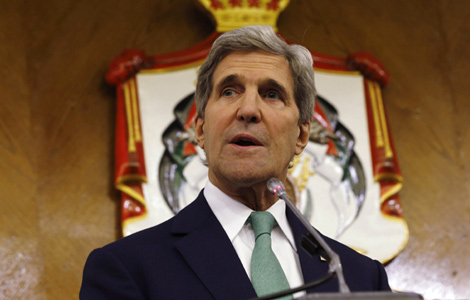
 Kerry to join Iran nuclear talks in bid to reach deal
Kerry to join Iran nuclear talks in bid to reach deal
Most Viewed
Editor's Picks

|

|

|

|

|

|
Today's Top News
US Oct jobless report paints dim picture
Obama's approval rating plunges to 41%
China's discipline agency targets holiday luxuries
Chinese land reform at crucial stage
Senior official at Cosco under investigation
Li appoints advisers to key govt think tank
Taxi driver is lone suspect in Taiyuan bomb blasts
Iran talks aim to close ' important gap': Kerry
US Weekly

|

|






